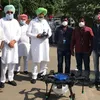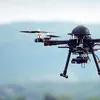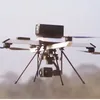This drone startup is taking on coronavirus with thermal detection headgear
Delhi-NCR drone startup Indian Robotics Solutions is taking the fight to coronavirus with its offerings: thermal detection headgear to scan body temperature and drones to monitor temperature and sanitise areas.
Sagar Gupta Naugriya was always interested in robotics. He liked tinkering with machines and understanding how they worked. This interest led him to engineering; he went on to join power solutions provider SuKam and in 2015 founded Delhi-based startup Indian Robo Store.
The drone startup began by selling robotic parts to hobbyists and college students, and assisting them on projects. During this time, Prashant Pillai, Sagar’s friend and colleague from SuKam, often pitched in to help.
But, hobbyists were not the startup’s target customers.
“The idea was to research, invent, and equip the defence and intelligence forces with state-of-the-art robotic solutions,” Sagar says.
The startup has moved on from those initial days. Since 2017, it has been working with the Indian Army, and other government bodies like Delhi Police, NDMC, Rail India Technical and Economic Service, Survey of India, UP Irrigation Department, and corporate clients like Sterlite Power, GK Minda, and KEC.
Prashant, who was working as a consultant earlier, joined as a co-founder in 2019.

The founders of Indian Robotics Solutions (IRS)
Working to quell coronavirus
With the coronavirus pandemic bringing the world to a grinding halt, startups are doing their bit to help out.
With Indian Robotics Solutions (IRS), Prashant and his co-founder are working to curb further spread of coronavirus in different ways. This includes land thermal detection headgear, known as Thermal Corona Combat Headgear (TCCH).
A person who wears this headgear will be able to thermally scan elevated body temperature (EBT) of individuals from a safe distance of 10-15 metres.
This technology will help on-ground police personal and health authorities scan many people at one time. It can be used at hospitals, supermarkets, and other public areas now and in the post-coronavirus world. The live imagery can also be sent to a centralised control centre for data.
“We are partnering with Delhi Police and are in the final stages of enhancing the product with the help of image processing so that the EBT of many people can be taken in a single frame automatically,” Prashant says.
While the technology cannot reveal if a person has coronavirus, it can zero in on people with a high body temperature, considered one of the preliminary symptoms of COVID-19 by WHO.
The startup also has another coronavirus-centric offering: the Thermal Corona Combat Drone. This can not only monitor temperature, but also has a day vision camera to see real-time images of the personnel, a disinfectant tank to sanitise the area after the suspected person is taken for further tests, a spotlight for night vision, a loudspeaker for giving instructions, and a portable medical box to carry essentials like medicines or COVID-19 testing kits.
“It has a flight time of 15 minutes with all the five utilities working together. Without the sanitising tank, it will fly for about 30 minutes. We gave a proof of concept to the government authorities at Majnu ka Tilla basti, Noida Sector 15 slums, and parts of Gurgaon. Once fully functional, we have the capability of screening over 500 individuals in three hours of flight time. We are in the final stages of perfecting the technology and reducing the deviation under one degree,” Prashant says.
The sanitisation pilot
The IRS team has also developed Corona Combat Drone (CCD), an advanced solution that can disinfect a large area in a short span of time. This autonomous technology has an in-built carrier for sanitising liquid with a capacity of 10 litres. It can cover an area of over 150X150 square metres, and 1.5-2 km in a single straight line flight. The speed is four metres per second, spray width is five to 10 metres, and time taken is 11 to 12 minutes.
"We started our sanitisation pilot programme in partnership with NDMC from Shakurpur Basti and have covered over 85 km of inaccessible areas. These 32 remote locations in Delhi house over 1.2 million underprivileged people,” Sagar says.
“Several areas in Lalbagh Basti, Karol Bagh, Sadar Bazaar, Patel Nagar, Paschim Vihar, Narela, and East Delhi were covered in two weeks. We also sanitised slums in Noida’s Sectors 15 and 16, which house about 10,000 people.”
The background
IRS was started with an initial funding of Rs 30,000 - Sagar’s savings. Since then, the founders have been pumping the profits back into the business to help it grow.
They recall that the shift from working with students and hobbyists to a drone startup happened in December 2016, when they started selling drone accessories and spare parts. The team also started repairing photographers’ drones, which gave them enough bandwidth to work on specific projects.
Sagar says the team eventually started developing UAVs at their technical lab after a prolonged period of testing and failing. In November 2017, they came up with their first indigenous drone, ‘Alex’.
Initially, the startup had to work on a marketing push and reached out via multiple organisations like India Mart. Soon, it started getting inbound calls from defence organisations and corporate institutions seeking different services.
IRS then started developing customised solutions for clients.
“We started expanding our team and eventually started offering more services like circuit designing, 3D designing, CNC, robotics workshops, and customised industrial robotic solutions. We developed a complete working robotic prototype to pull the OPGW wire through a robot. The company, one of the renowned power grid companies in India, later got it patented,” Prashant says.
From 2018 to 2020, the duo say their startup provided government and military clients with different solutions such as All-Terrain Vehicle with a robotic arm, GSM and GPS tracker, solar circuits, AC duct inspection robot, day surveillance drone, thermal drone for night inspection, payload drone, stringing drone for transmission line, GIS mapping through drone flight training, open CV/image processing solutions etc.
“We provide a one-year warranty for all our robotic solutions and annual maintenance contracts as well,” Sagar says. IRS designs, codes, manufactures, and tests over 70-80 percent parts of the products in-house at their lab.
“We acquire a few parts from Western and European countries. We do five-step testing; this involves 360-degree testing on the viability, safety, and utility verification of the product and ensures product feasibility,” Sagar adds.
Working with regulations
Like any drone startup in India, the team has been working with the government for refinement of regulations.
Prashant explains that the government and concerned authorities will be coming up with a reworked set of regulations in the coming months. He adds that emergence of the NPNT model was a good step towards the integration of ATM and UTM.
“We are hoping the regulations will open the doors for drones to be used for civilian applications. We already have offices in Delhi and Bhopal, and plan to start one in Hyderabad soon. We are looking for private VCs and hedge funds,” Prashant says.
Taking on the competition
Several drone startups are working with the government to help combat coronavirus. Apart from IRS, others include Garuda Aerospace, which is working on sanitisation efforts, Mumbai-based , which is monitoring social distancing, and Telangana-based Marut, which is also helping in sanitisation.
A group of researchers at IIT-Guwahati have also developed a drone for disinfection of larger areas, while another group has come up with an infrared camera-equipped drone that can help in thermal screening of groups without human intervention, and to identify suspected COVID-19 cases at an early stage once the lockdown is lifted.
"Moving forward, we would be working on robotic solutions such as stealth land rovers and transformable drones, which can traverse all kinds of terrain for Indian intelligence agencies. We will be integrating an AI-based system and thermal imaging in the CCD soon. We are already working with the army for the past three years and I am sure we will be able to assist the defence authorities better in the time to come,” Prashant says.
Edited by Teja Lele










